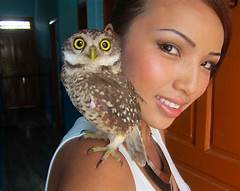Owls as Pets
Owls are fascinating birds that have captured the imaginations of people for centuries. While it may seem intriguing to have an owl as a pet, there are many factors to consider before making this decision. This article aims to provide comprehensive information on the legality, care requirements, and ethical considerations of keeping owls as pets.

Legality of Owning an Owl as a Pet
The legality of owning an owl as a pet varies widely depending on the location. In most countries, it is illegal to possess an owl without a permit. In some areas, it is prohibited to keep owls as pets altogether. It is crucial to research the local regulations and obtain the necessary permits and licenses before considering owl ownership.
Care Requirements for Pet Owls
Owls are demanding pets that require specialized care. Here are some key aspects to consider:
Diet:
Owls are primarily carnivorous and have specific dietary needs. They require a balanced diet consisting of fresh rodents, birds, and insects. Providing a varied and nutritious diet is essential for their overall health and well-being.
Housing:
Owls need a spacious and secure enclosure that mimics their natural habitat. The enclosure should be large enough to allow for flight and perching. It should also include areas for hiding, nesting, and bathing.
Health Care:
Owls require regular veterinary care, including vaccinations, parasite control, and checkups. Access to an experienced avian veterinarian is essential for the owl's long-term health.
Ethical Considerations of Owl Ownership
In addition to legal and care requirements, ethical considerations play a critical role in the decision to keep an owl as a pet:
Wild Nature:
Owls are wild animals and are not domesticated. They are adapted to living in their natural environment, where they can hunt, fly, and interact with their own species. Keeping an owl in captivity deprives it of these essential aspects of its natural life.
Imprinting:
Owls imprint on their parents during their early development. Once imprinted, they may become dependent on humans, which can lead to behavioral problems and difficulties in releasing them back into the wild if necessary.
Conservation:
Owls play a vital role in maintaining ecological balance by controlling rodent populations. Removing owls from their natural habitats disrupts this balance and can have negative consequences for the ecosystem.
Conclusion
Owls are captivating creatures, but they are not suitable pets for most people. The legal, care, and ethical considerations associated with owl ownership make it a challenging and potentially harmful endeavor. If you are interested in owls, consider participating in educational programs, birdwatching, or volunteering at wildlife centers to appreciate them in their natural surroundings.
Declaration: All article resources on this website, unless otherwise specified or labeled, are collected from online resources. If the content on this website infringes on the legitimate rights and interests of the original author, you can contact this website to delete it.



